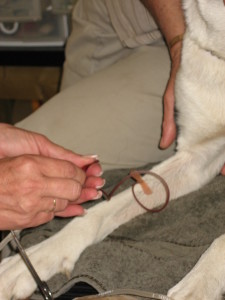April is Heartworm Awareness and Lyme Disease Prevention Month
 Each year, Keshet Kennels/Rescue recognizes April as being both National Prevention of Lyme Disease in Dogs month and National Heartworm Awareness month. Both of these programs aim to raise awareness about the causes, treatments and potential risks associated with these diseases. Their goal is also to educate and inform pet owners that prevention is the key to keeping your pets healthy throughout the summer months.
Each year, Keshet Kennels/Rescue recognizes April as being both National Prevention of Lyme Disease in Dogs month and National Heartworm Awareness month. Both of these programs aim to raise awareness about the causes, treatments and potential risks associated with these diseases. Their goal is also to educate and inform pet owners that prevention is the key to keeping your pets healthy throughout the summer months.
Heartworm
Heartworm is a transmittable parasite that matures, lives and feeds in the heart, lungs and large vessels of dogs. Despite the fact that canids (dogs, wolves, foxes and coyotes) are the natural host for heartworms, they can also be passed along to other pets and even people. The most common way that heartworm is transmitted from one individual to another is through mosquitos. Mosquitos become carriers for the parasite after they take a blood meal from an infected host. The heartworm larvae travel through the blood stream and are easily passed from one host to the next. Once the mosquito bites and the heartworm larvae are introduced to a new host, the parasite makes its way to the heart. This is where the larva will begin the next stage in its lifecycle and molt into an adult. It is primarily the adult worms that are responsible for the symptoms and conditions related to this disease which range in severity but can, ultimately, lead to death.
Heartworm testing should be a part of your annual or, at minimum, bi-annual pet care program along with vaccinations, fecal samples and general check-ups. It is generally recommended that heartworm testing be done in April or May of each year. This is because it normally takes about six months for a dog to test positive after it has become infected. Essentially, the tests that are done each year are checking for an infection that would have been introduced last mosquito season.
Heartworm preventatives should also be a part of your annual pet care regime. They work by killing off the larval stage of the parasite so that they are not able to molt into adults. Veterinary approved preventatives given in pill, topical or injectable form should be given on a strict monthly schedule for about 6 months, or however long mosquito season lasts in your area. It only takes about 50 days for the larvae to molt into adults which means that skipping a dose of heartworm preventative could be detrimental to your pet’s health. Once the larvae molt, preventatives are largely ineffective and the more invasive and expensive treatment to kill the adults becomes necessary.
Lyme Disease
Lyme disease is the most commonly transmitted tick borne disease in North America. The Blacklegged tick (or Deer tick) is the species of tick that is primarily responsible for transmitting the bacteria that cause Lyme disease. When the tick takes a blood meal from an infected animal (usually deer or mice), the borrelia bacteria are also injested. The bacteria live in the tick’s gut until passed on to the next host. When a tick bites a new host, it usually needs to feed for several days in order to get a full meal. Most studies state that the tick must feed on a host for 36-48 hours before the bacteria living in the tick’s gut can be passed on to the new host.
 These bacteria are responsible for causing an inflammatory infection and, although symptoms may differ on a case-by-case basis, they typically include stiff gait, fever and muscle or joint stiffness. Overall, the risks that Lyme disease present are significantly less in dogs than in humans. Although the disease is fairly treatable, especially if caught early, it can still cause severe and lasting damage to any pets or people that contract it. Again, taking preventative actions against ticks by incorporating a flea/tick deterrent will help to ensure you are doing your part to stop the spread of this disease.
These bacteria are responsible for causing an inflammatory infection and, although symptoms may differ on a case-by-case basis, they typically include stiff gait, fever and muscle or joint stiffness. Overall, the risks that Lyme disease present are significantly less in dogs than in humans. Although the disease is fairly treatable, especially if caught early, it can still cause severe and lasting damage to any pets or people that contract it. Again, taking preventative actions against ticks by incorporating a flea/tick deterrent will help to ensure you are doing your part to stop the spread of this disease.
There are many reasons to incorporate annual testing into your regular pet care program. The most important of which is to ensure your pet stays healthy and happy for as long as possible. Due to a rise in documented cases of Lyme disease in our area, and based on our veterinarian’s advice, we added the Lyme vaccination to our list of annual vaccines. Remember, heartworm and Lyme disease are also transmittable to humans so taking the necessary precautions will go a long way in protecting all members of the family.
To learn more about heartworm, check out Keshet’s You Tube video on Heartworm Testing and Heartworm Preventatives. You can also find great information about tick identification and removal in one of our earlier blogs, Tick-Talk.

